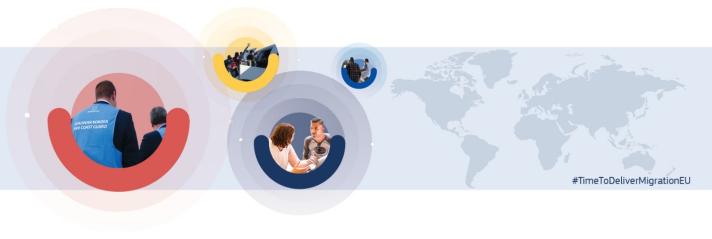This blog is a weekly update of the progress we are making on the Europeanisation of migration and asylum policy. Last week’s developments underlined the urgency of that task. The week saw the
- EU High-level Forum on providing protection to Afghans at risk
- The discussion of border management and external outreach at the Justice and Home Affairs Council of Ministers in Luxembourg
- Concerning reports of pushbacks in Croatia, Greece and Romania
Regarding the High-Level forum myself and HRVP Borrell organised and co-hosted, as I said in the press conference that followed we had a very encouraging meeting, with an impressive level of attendance and political commitment.
Let’s remember what we have already achieved, as the EU and Member States. 18,000 Afghans evacuated and received protection in EU member states. 10 000 vulnerable persons, e.g. because of ideological reasons, have been identified as in need of evacuation. The European External Action Service (EEAS) is starting its presence on the ground in Afghanistan.
We have managed to provide funds via humanitarian actors (which are exempted from the sanctions regime) for humanitarian activities. In this way we can give basic and vital aid to those must in need.
We are establishing an expert platform on resettlement, one in which Canadian, British and American representatives will participate.
We have to be realistic, as we will not be able to evacuate all in need of support. That’s why it is so important that Member states also step up in other ways to provide humanitarian assistance, such as increasing support to civil society organisations working on the ground.
I also took time to emphasise that there has been no marked increase in Afghans leaving the country and attempting to reach the European Union, but the bloc should continue working to assist those inside Afghanistan and especially in the neighbouring countries, like Pakistan. In this regard, we are preparing an "Afghan Support Package" to be unveiled in the coming weeks.
In practical terms, we need to make progress on the EU Resettlement Framework and amending Regulation. The aim of the proposal is to establish a permanent resettlement framework for the EU, with common rules on admission, procedures for the resettlement process, types of status accorded, decision-making procedures, and financial support for Member States participating in the framework. This would allow more predictability and less of an ad-hoc approach.
Regarding the JHA Council, as I said in the Press conference which followed, there is a ‘glass half full’ scenario. There was a detailed discussion on our screen proposal and on eurodac (fingerprint database for identifying asylum seekers and irregular border-crossers).
Member State agree on the substance of the proposals, and indeed on their merit. Where they still need to converge is on whether this agreement on the substance can be converted into continued progress on the migration and asylum proposals.
On screening, fast, integrated procedures will ensure clearer responsibilities, helping restore trust between Member States. The aim is to have Identification confirmed. Health and security check would be done quickly and efficiently. An individual assessment would be made and there would be clear monitoring throughout to ensure fundamental rights are adhered to.
The Eurodac proposal would do the following procedures. The focus is on the applicants rather than application to determine responsibility for asylum claims. It would deter unauthorised movements to other Member States. It would improve and facilitate relocation and better monitoring of returnees. And it would track support for voluntary departure and reintegration. There is also a special category in Eurodac for Search and Rescue cases.
On the reports of pushbacks, I have extensively commented that I am very concerned of these reports, and that member countries are obliged to investigate. I am grateful for the strong reaction and the commitment from the Croatian Prime Minister, Andrej Plenković. The recognition in Croatia, of the involvement of official personnel, is already a positive, if difficult, admission. This reaction from Croatia is a good example to follow. Any violent conduct should be dealt with the full rigour of the law. And as I said before, I take seriously our responsibility to take action should any proof of misuse of EU funds be established.
The events of this week point again to what should be obvious; a more European approach to migration and asylum is needed.
#TimetoDeliverMigrationEU
This blog outlines the benefits of the proposals on migration tabled by the European Commission on 23 September 2020. For more detail on the New Pact on Migration and Asylum see below.
For More information
New Pact on Migration and Asylum | European Commission (europa.eu)
Commissioner Johansson’s speech at the High Level Forum on Resettlement, 9 July 2021
Commissioner Johansson’s blog: More legal pathways to the EU
DG Migration and Home Affairs website: Resettlement and other pathways to protection
Details
- Publication date
- 10 October 2021
- Author
- Directorate-General for Communication

